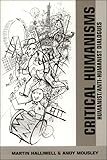Critical Humanisms : Humanist/Anti-Humanist Dialogues / Martin Halliwell, Andrew Mousley.
Material type: TextPublisher: Edinburgh : Edinburgh University Press, [2022]Copyright date: ©2003Description: 1 online resource (240 p.)Content type:
TextPublisher: Edinburgh : Edinburgh University Press, [2022]Copyright date: ©2003Description: 1 online resource (240 p.)Content type: - 9780748615049
- 9781474468695
- online - DeGruyter
| Item type | Current library | Call number | URL | Status | Notes | Barcode | |
|---|---|---|---|---|---|---|---|
 eBook
eBook
|
Biblioteca "Angelicum" Pont. Univ. S.Tommaso d'Aquino Nuvola online | online - DeGruyter (Browse shelf(Opens below)) | Online access | Not for loan (Accesso limitato) | Accesso per gli utenti autorizzati / Access for authorized users | (dgr)9781474468695 |
Frontmatter -- Contents -- Acknowledgements -- Introduction: Towards a Critical Humanism -- 1 Romantic Humanism (Shakespeare — Marx — Cixous) -- Existential Humanism (Sartre — Arendt — Fanon) -- 3 Dialogic Humanism (Freud — Irigaray — Levinas) -- 4 Civic Humanism (Wollstonecraft — Habermas — Hall) -- 5 Spiritual Humanism (Benjamin — King — Kristeva) -- 6 Pagan Humanism (Nietzsche — Bakhtin — Bataille) -- 7 Pragmatic Humanism (James — Dewey — Rorty) -- 8 Technological Humanism (Foucault — Baudrillard — Haraway) -- Conclusion: Inhuman, Posthuman, Transhuman, Human -- Notes -- General Bibliography -- Index
restricted access online access with authorization star
http://purl.org/coar/access_right/c_16ec
GBS_insertPreviewButtonPopup('ISBN:9780748615056);This distinctive reappraisal of humanism argues that humanist thought is a diverse tradition which cannot be reduced to current conceptions of it. By considering humanism via the categories of Romantic, Existential, Dialogic, Civic, Spiritual, Pagan, Pragmatic and Technological Humanisms, Halliwell and Mousley propose that the critical edge of humanist thought can be rescued from its popular view as intellectually redundant. They also argue that because these humanisms contain within them anti-humanist perspectives, it is possible to counter the charge that humanism is based upon an unquestioned image of human nature.The book focuses on the thought of twenty-four mainly European and North American thinkers, ranging historically from the Renaissance to postmodernism. It discusses foundational writers (some of whom have been claimed as anti-humanists) such as Marx, Nietzsche, Freud, Dewey and Sartre as well as the contemporary thinkers Habermas, Cixous, Rorty, Hall and Haraway, to construct a series of provocative dialogues which suggest the ongoing relevance of humanism to issues of ethics, art, science, selfhood, gender, citizenship and religion. Given the range and originality of the book's approach, Critical Humanisms will be an invaluable resource for students and researchers in the Humanities, particularly English, American studies, cultural studies, modern languages, philosophy and sociology."
Mode of access: Internet via World Wide Web.
In English.
Description based on online resource; title from PDF title page (publisher's Web site, viewed 29. Jun 2022)


